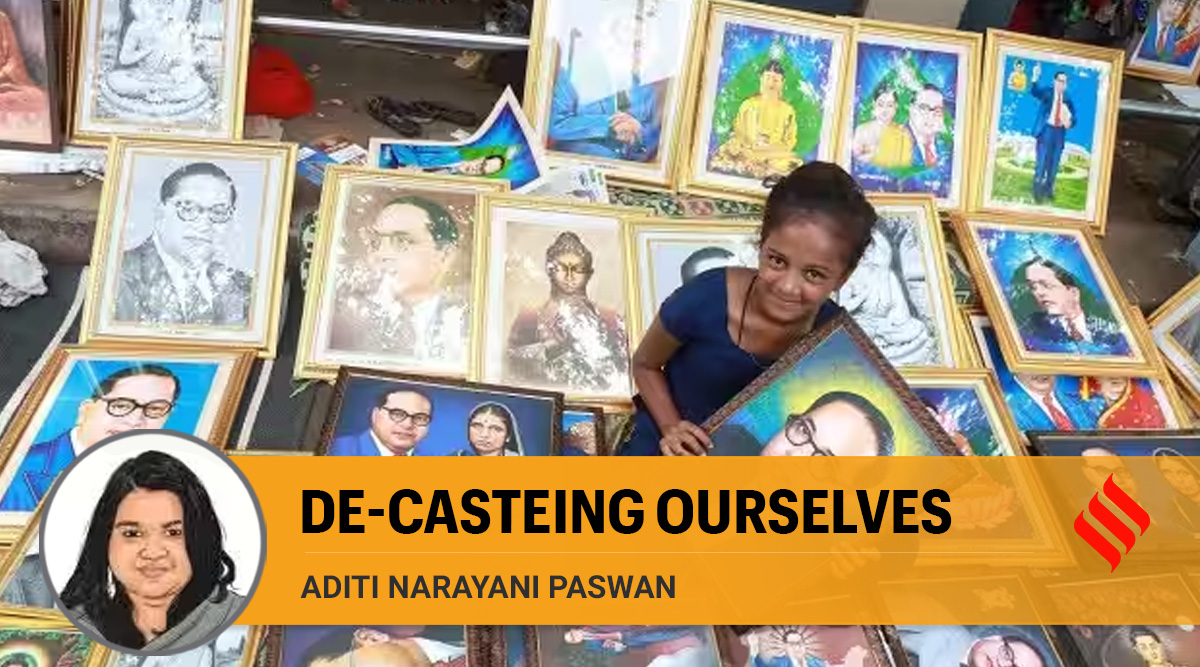As we work towards decolonising our consciousness, there is another task that we as a nation need to embark upon — the work of “de-casteing” ourselves. Despite the enormity of the task of decolonising ourselves, I believe that doing so is easier than throwing off the yoke of caste and casteism. All Indians acknowledge the political, economic, and cultural domination suffered under colonialism and we can therefore move towards establishing an Indic framework of life and history. But how do we proceed to de-caste ourselves when we deny its stranglehold on our society?
Growing up, I tried to live as “castelessly” as possible — not that it worked. Since then, I have not only accepted my identity as a dark-skinned Dalit, but taken my power back as a Dalit woman. It takes decades for us to accept our surnames, from Kumars and Rams to Paswans to Meghwal. Listening to people say that we live in a casteless society or that they don’t see caste is a reminder of how easy it is to obliterate our stories, deny us agency over own lived experiences. If there is no caste, or the crushing exclusion stemming from its practise, why would Darshan Solanki choose to die by suicide? Why would a child be beaten to death because he didn’t know which pot of water to drink from? Why would young men be shot for riding a horse?

On social media, I have seen people fighting against reservation and for “merit”. If, even after 75 years of independence, there is under-representation of marginalised communities in prestigious institutions then we definitely need to revisit the reservation policy. People don’t visit doctors with lower-caste surnames, slamming them as “non-meritorious quota kids”. Whenever a dam, building or bridge collapses, we start googling the name of the chief engineer and hate comments follow, saying “must be from a reserved category”.
Being alert to every occasion when we are singled out for our caste identities is every Dalit’s lot. So to tell us that caste is simply categorisation, or an ascriptive identity that has no bearing on how our lives will shape up is violence against our selfhood. Others can choose not to see caste; we aren’t allowed to. In the 77th year of our Independence, let’s accept that casteism is a reality of Indian society. Acknowledging that caste-identities shape and transform our relationship with society and access to opportunities is imperative. Denying it only leads to radicalisation of these identities, widening the chasm. If we are to ever achieve a truly casteless society, this acceptance is important because how do we fight an anomaly that we don’t acknowledge?
We have occupied space in Lutyens Delhi because of the Constitution but our struggle is for memberships in the elite institutions on Lodhi road. We have political participation and representation, but we need representation in the kala sangams, drama schools, intellectual spaces and in the media. Reservation can’t ensure our participation in these arenas; we need the support of people who are already there.
Most Read 1Chandrayaan-3 mission: Dawn breaks on Moon, all eyes on lander, rover to wake up 2As Indo-Canadian relations sour, anxiety grips Indian students, residents who wish to settle in Canada 3Karan Johar says Sanjay Leela Bhansali did not call him after Rocky Aur Rani: ‘He’s never called me but…’ 4Gadar 2 box office collection day 40: Hit by Shah Rukh Khan’s Jawan onslaught, Sunny Deol movie ends BO run with Rs 45 lakh earning 5Shubh’s tour in India cancelled: Why is the Canada-based singer facing the music?
When the world is emphasising diversity, inclusion and equity, our nation as an emerging power must ensure these in our policies too. As Dalits, we might also have a distrust for upper segment of the society. Denying our Dalithood only causes that distrust to fester. For my Dalit brothers and sisters, the distrust we have for others also needs to be worked on — getting triggered is not the way ahead or out. Now is the time for a transition from victimhood to “victory hood”.
While celebrating Azadi Ka Amrit Mahotsav, we have acknowledged and celebrated local and regional icons. Our surnames have a history and now we must accept our glorious histories. The Indian independence movement is incomplete without Dalit participation. The names of Jhalkaribai, Uda Devi, Mahabiri Devi, Mangu Ram and other Dalit figures were earlier erased, but are now taken with great pride and honour. We are reclaiming our history in a dignified and inclusive way. In moving towards “sabka saath, saabka vikas and sabka prayaas”, we need to make sure nobody is left behind by achieving “sabka vishwas”.
Also ReadWill reservation really help Indian women?Pratap Bhanu Mehta writes on new Parliament: India’s age of ambitionValues Kota imparted: Anxiety and building a future on a butchered presentWith G20-IMEC plan, the global order shifts to Eurasia
The writer is assistant professor, Maitreyi College and founder of DAPSA (Dalit Adivasi Professors and Scholars Association


